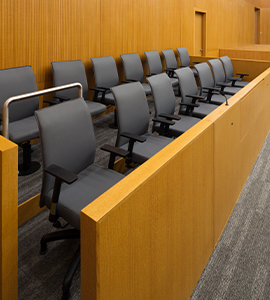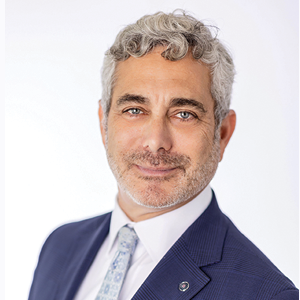How Criminal Cases in Maryland are Tried
How are criminal cases in Maryland tried? In the State of Maryland, there are two ways to have your criminal case tried; the first way is a bench trial where your case is heard only by the judge in District Court. The second way is a jury trial, where the outcome of your case is decided by a 12 person jury of your peers. These cases are tried in Circuit Court. Any criminal defendant in any criminal case no matter how small or large a case they have can have their case tried in front of a judge.
In Maryland, the District Court hears smaller matters, generally, misdemeanors and traffic violations, and all facets of the case are in the hands of the judge. That is to say, the judge rules on all legal issues makes the ultimate decision of guilt or innocence, and if the Defendant is found guilty, that same judge sentences them.
Within the State of Maryland, each county (and Baltimore City) has its own Circuit Court which hears all jury trial prayers (District Court Defendants who request a trial by jury) and most felony matters. In a Maryland jury trial, the defendant their attorney selects 12 people from a large pool of jurors.
Those 12 people listen to all of the evidence against the Defendant and after hearing the evidence and legal arguments, decide whether the defendant is guilty or not guilty of the charges against him. In jury trials, the judge must rule on the procedural and evidentiary issues such as who can testify, what witnesses can testify about, what documents or physical evidence the jury can consider, and if the defendant is found guilty, the judge renders a sentence.
A Jury Trial or a Bench Trial?
In Maryland, a defendant is entitled to a jury trial if he faces the possibility of more than ninety (90) days in jail. As an example, if you are charged with Driving While Impaired (DWI) in Maryland, where the maximum penalty is only sixty (60) days in jail, you would not be entitled to a jury trial. Your case would be tried at a bench trial and only in the District Court.
If you are charged with Second Degree Assault in Maryland (including misdemeanor domestic assault) the maximum penalty, (despite it only being a misdemeanor) is ten (10) years in prison. As that charge is not a felony, you could choose to have your trial in front of a judge of the District Court and be done with it, but if you wanted a jury trial, you simply ask for one and your case will be moved to the Circuit Court for that county as District Courts in Maryland State Court do not have juries.
Keep in mind that if you decide to have your case tried in the District Court and don’t like the outcome, the law in Maryland currently allows you to file an appeal from the District Court decision and receive an entirely new trial in the Circuit Court. That new trial in the Circuit Court can be held in front of a judge or in front of a jury at the defendant’s election.
Advantages of a Bench Trial
Speed
As a rule, bench trials are set for trial quickly, and the trials themselves don’t take as long as a jury trial since there is no jury selection process, no jury instructions and no jury deliberations where 12 people have to all agree; in a bench trial, it’s only the judge who needs to be convinced beyond a reasonable doubt.
Managing Emotionally Charged and Troubling Allegations
In many cases, there are going to be facts that are going to come out in a trial, which may prejudice jurors against the defendant. In some criminal cases, the very nature of the charge itself (ie. Child pornography) may affect a juror’s ability to be neutral about the defendant’s guilt or innocence.
While an experienced criminal defense attorney will attempt to keep biased potential jurors off of the jury in a case, people are often not truthful about their biases and prejudices and there is always the risk that this will affect the outcome of a case.
While judges are also people with feelings and biases, they are trained to be neutral. It is also important to remember that judges at bench trials are almost always dealing with issues they’ve seen countless times before. In an emotionally charged case, a judge is often far less likely to have a bias or be shocked by what he or she sees and hears in a courtroom.
Understanding the Law
Many criminal law cases involved subtle and sometimes complex issues of law. While it is the judge’s job to rule on evidentiary issues in the trial process, jurors are tasked with deciding what evidence they believe and then applying the law to those facts they deem true. There is often concerns by criminal defense lawyers that juries in more complex cases may have difficulty properly sorting through what are often complex issues. There is always a chance that a jury will decide issues on emotion rather than applying the legal rules they’ve been instructed to use.

Advantages of a Jury Trial
Only One Person Has to be Convinced You’re Guilty.
Since the only one who has to be convinced that a defendant is guilty in a bench trial is the judge, if that judge doesn’t see things your way, you will be convicted. In a jury trial, there are twelve (12) individuals all of whom must be convinced beyond a reasonable doubt of the defendant’s guilt.
If even one of those people has doubts and refuses to vote for a conviction, then a mistrial is called by the judge and the prosecution may elect to dismiss the case or retry it at a later date. Either way, you only need to win over one (1) in twelve (12) people to avoid a conviction.
Whether at a Bench or Jury Trial a Judge Knows all the Evidence.
At a jury trial, the judge is the “gatekeeper” as to what evidence the jury is allowed to hear and makes these determinations outside of the hearing of the jury. If for example the judge thinks the evidence is too prejudicial for a juror to hear, the judge will not allow it to be used at trial. In order to decide whether it is appropriate evidence to be used the judge will usually have to know what the evidence is.
At a bench trial since the judge will unfortunately have to hear the information, while they are not supposed to consider it, they are human it is possible that the damning but inadmissible evidence will affect their decision.
Judges Know and Almost Always Follow the Rules
One of the strategies used by experienced criminal defense attorneys at trial is to sway jurors by playing on emotion and try to win them over with the defendant’s (and sometimes the lawyer’s) likeability. Indeed, in many cases, a good criminal defense attorney can successfully portray their defendant as the victim. If only one juror is emotionally swayed, the defendant can’t be convicted. Judges on the other hand see these types of cases every day and are far less likely to make a finding based upon emotion.
Public Pressure
Judges are political animals, and while they are supposed to be neutral finders of facts, they are sometimes under pressure from the public, attorneys and sometimes even other judges to rule a certain way in a certain kind of case. This “public pressure” shouldn’t, but can affect how a judge feels obliged to rule on a particular case. Jurors on the other hand are generally not affected by political pressure, though as addressed above, they are generally more subject to emotional manipulation.
The Effect of COVID-19 on Criminal Trials in Maryland
Courts have been effectively shut down for all but emergency matters since the evening of March 13, 2020. Since that time, an Administrative Order from the Chief Judge of the Court of Appeals for the State of Maryland has precluded trials except for certain specific hearings in a very limited number of matters.
Bench trials are going to be phased in, theoretically, after June 8, 2020, in which different jurisdictions treating their reopening differently. No court is allowed to open before the June 8, 2020 date, but many will not truly “open for business” for many weeks and months after that date.
Jury trials are presently banned until at least October 5, 2020. Some jurisdictions have suggested to Attorneys that they may not be resuming jury trials until 2021. If that becomes the case, the implications may be good or bad for a particular defendant depending upon their position. Obviously a defendant who is incarcerated and wants a jury trial will be detained for longer than they ever anticipated without being tried.
Furthermore, the Chief Judge of the Court of Appeals in her administrative orders has ordered that due to the COVID-19 emergency, the delay in trying these individuals will not be a violation of their right to a speedy trial. Of course, the defendant who is “on the street” pre-trial will want to request a jury trial, knowing that their case can not be tried before October 2020 and will likely be delayed into 2021.
As the issues surrounding COVID-19 delays as they relate to criminal law in the State of Maryland are complex, it is important to get the advice of an experienced criminal defense attorney who can help guide you through these unprecedented times.
The Importance of an Experienced Maryland Criminal Defense Attorney
One of the first decisions that need to be made in a criminal case is whether or not your case is going to be tried in front of a judge or before a jury. This may be one of the most important decisions you ever make. While the information which we give you above is a basic guide to the pros and cons of each type of trial, you absolutely should not make that decision on your own.
An experienced Maryland Criminal Defense Attorney will know the judges, the Court, and have experience with your type of case. They should be consulted before you elect what kind of trial you should have. At the Law Offices of Craig M. Kadish & Associates, LLC, we are experienced Maryland criminal defense lawyers in our fourth decade of providing our clients with precise and prepared defenses to the charges which they face.


